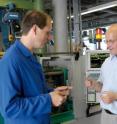Savvy injection molding
The metal components used in the hinges of spectacle frames, surgical instruments or artificial heart valves are often very small. For some years now, manufacturers of components with complex geometries of this type have relied on a special production process: metal injection molding. Things can occasionally go awry during production, and then it is often impossible to detect defects until after sintering, the final step in the process chain, by which time it is too late to correct the defect. Now, researchers at the Fraunhofer Institute for Manufacturing and Advanced Materials IFAM are working towards achieving zero-defect production. Their idea is that, at any time during the molding process, the system should be able to monitor all parameters – such as weight, pressure and temperature – and to deliver a verdict on the quality of the component. »In this way, errors, dimensional inaccuracies and defects such as cracks, warps or cavities can be detected on line,« explains IFAM project manager Dr. Thomas Hartwig. »This will allow the manufacturer to respond immediately by changing the relevant settings.« In the long run the system can, if required, even be programmed to alter the parameters fully automatically. The necessary technical support is provided by a neural network developed for metal injection molding (MIM) in a joint effort by the IFAM engineers and algorithmica technologies, a private company. »The neural network is based on highly complex algorithms,« says Hartwig. »Its advantage over existing solutions is that it is self-learning.« After a mandatory initial training phase it can interpret all the measured data in the system, detecting correlations between them that would be impossible to find without the network. All information of relevance to the manufacturer can be given by the process control system, for instance the final weight of the component if the pressure or temperature is changed at a given step in the process.
»Our goal with neural networks is to reduce reject rates by at least 50 percent,« says Hartwig. »This represents a huge cost saving for manufacturers because the raw materials are so expensive. Until now, companies often had to reject large numbers of components in the first few days before quality requirements could be met again.« Another advantage of neural networks is that they could eventually make quality checks superfluous and could also be deployed in other types of series production such as die-casting in the light-metal industry. Having successfully produced a test component with the aid of neural networks, the researchers are now looking for industrial partners.
Source: Fraunhofer-Gesellschaft
Other sources
- Savvy injection moldingfrom Science DailyWed, 7 Apr 2010, 2:28:39 UTC
- Savvy injection moldingfrom Science BlogTue, 6 Apr 2010, 13:42:18 UTC
